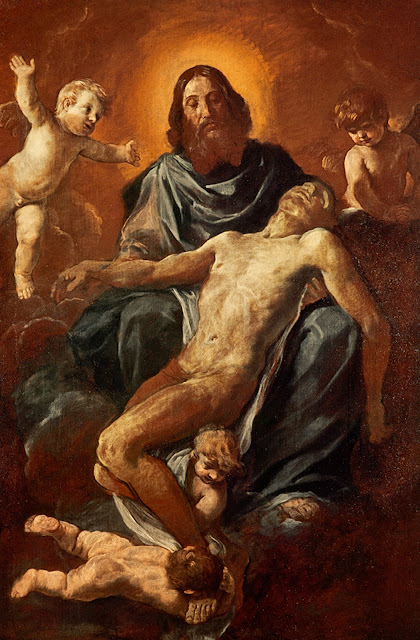 |
| Christoph Schwarz Abduction of Proserpine ca. 1573 oil on canvas Fitzwilliam Museum, Cambridge |
 |
| Abraham Bloemaert Miracle of the Loaves 1593 oil on canvas, mounted on panel National Galleries of Scotland |
"Bloemaert probably painted this recently discovered work shortly after his 1591-92 stay in Amsterdam. There he would have met artists from Haarlem, the birthplace of Dutch Mannerism. Typical of Mannerist paintings, the main scene takes place in the middle distance. The story is related in all four Gospels. Christ miraculously fed five thousand of his followers with just five loaves and two fishes. The scene is framed and partly obscured by monumental twisted figures in the foreground, modelled in sharp contrasts of light and shadow and acid colours."
 |
| Ambrosius Francken The Judgement of Zaleucus 1606 oil on panel Fitzwilliam Museum, Cambridge |
 |
| Anthony van Dyck St Sebastian bound for martyrdom ca. 1620-21 oil on canvas National Galleries of Scotland |
 |
| Vicente Carducho Dream of St Hugh, Bishop of Grenoble ca. 1626-32 oil on canvas National Galleries of Scotland |
"This is a preparatory modello for one of the series of fifty-six large canvases illustrating the life of St. Bruno and other episodes in the history of he Carthusian order, which Carducho painted between 1626 and 1632 for the Carthusian monastery of El Paular, near Segovia. St Hugh dreamt that heavenly spirits built a temple and houses at Chartreuse in his diocese, to which stars guided them. St Bruno followed this omen by founding his monastery there."
 |
| Andrea Sacchi St Anthony Abbot reviving a dead man ca. 1635 oil on panel National Galleries of Scotland |
 |
| Peter Paul Rubens Feast of Herod ca. 1635-38 oil on canvas National Galleries of Scotland |
"Herodias' daughter Salome had danced so beautifully that Herod had promised to grant her any wish. Prompted by Herodias, Salome asked for the head of John the Baptist. This was Herodias' revenge for the Baptist's outspoken criticism of her marriage to Herod. Here, Salome presents John the Baptist's head to King Herod. Herod shrinks back in horror. To his left, Herodias prods the Baptist's tongue with a fork."
 |
| Simone Cantarini The Holy Trinity ca. 1640-48 oil on canvas (unfinished) National Galleries of Scotland |
 |
| Giovanni Battista Carlone Juno and Mars ca. 1650 oil on canvas (bozzetto for ceiling fresco in Genoa) Fitzwilliam Museum, Cambridge |
 |
| Guercino Erminia finding the wounded Tancred ca. 1650 oil on canvas National Galleries of Scotland |
"This large dramatic painting illustrates a scene from Torquato Tasso's great epic poem about the Crusades, Gerusalemme Liberata (1581). Erminia has rushed to the spot where her lover Tancred lies severely wounded. His squire Vafrino kneels over him. The complimentary poses, gestures, and expressions of the three figures reflect their emotions and the poignancy of the moment. The sombre hues of the landscape enhance the gravity of the event. Cardinal Fabrizio Savelli, Papal Legate of Bologna, commissioned the picture in 1650, but allowed the Duke and Duchess of Mantua to buy it from the artist in 1652."
 |
| Salvator Rosa L'Umana Fragilità ca. 1656 oil on canvas Fitzwilliam Museum, Cambridge |
 |
| Simone Pignoni Poet presented to Jupiter by Hercules is crowned by Glory with Venus, the Poet, and Cupid below before 1698 oil on canvas (bozzetto for ceiling painting) Fitzwilliam Museum, Cambridge |
 |
| Marco Benefial Vision of St Philip Neri 1721 oil on canvas Fitzwilliam Museum, Cambridge |
 |
| Giovanni Camillo Sagrestani Virgin with St John before 1731 oil on canvas (bozzetto for Crucifixion painting) Fitzwilliam Museum, Cambridge |
 |
| Luigi Agricola Cadmus and the Dragon ca. 1780 oil on canvas (bozzetto for ceiling painting in Rome) Fitzwilliam Museum, Cambridge |
– quoted texts are from curator's notes at the National Galleries of Scotland